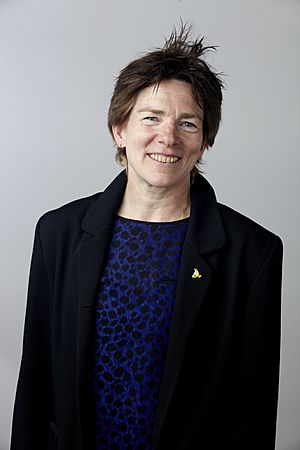Jenny Nelson facts for kids
Quick facts for kids
Jenny Nelson
FRS FInstP
|
|
|---|---|

Jenny Nelson at Royal Society admissions day in London, July 2014
|
|
| Born |
Jennifer Nelson
|
| Nationality | Irish |
| Alma mater | University of Cambridge (BA) University of Bristol (PhD) |
| Awards | Armourers and Brasiers' Company Prize (2012) Faraday Medal and Prize (2016) |
| Scientific career | |
| Fields | Solar cells |
| Institutions | Imperial College London |
| Thesis | Optics of fractal clusters: with reference to soot (1988) |
| Doctoral advisor | Michael Victor Berry |
Jenny Nelson is a brilliant scientist who studies physics. She works at Imperial College London where she is a professor. She also leads a team that works on stopping climate change by finding ways to reduce harmful gases in the air.
Contents
Jenny Nelson's Education
Jenny Nelson went to two well-known universities. She studied at the University of Cambridge and then at the University of Bristol. In 1988, she earned her PhD degree from Bristol. Her research there was about how light behaves when it hits tiny, complex shapes, like soot particles.
Researching Solar Cells
Jenny Nelson's main work is about making solar cells better. Solar cells are amazing devices that turn sunlight into electricity. She uses different methods, like building physical models, running computer simulations, and doing experiments. Her goal is to make these devices work as well as possible by improving the materials they are made from.
Working with Different Materials
For over 25 years, Professor Nelson has explored many types of materials for energy conversion. These include tiny molecular materials and inorganic materials like nanocrystalline oxides. She also works with new "hybrid" materials that mix organic and inorganic parts. She studies how these materials behave with light and electricity. This helps her design better solar cells, and many companies are interested in her ideas.
Solar Energy and Climate Change
Since 2010, Jenny Nelson has also been looking at how solar power can help fight climate change. By using solar cells to make electricity, we can reduce the amount of carbon dioxide released into the air. This helps protect our planet. She even wrote a popular book called The Physics of Solar Cells to explain how these devices work.
Her research often focuses on understanding new materials that have very tiny structures. She checks her ideas against real-world experiments. Most importantly, she uses her science skills to solve big energy problems, especially in making solar power more effective.
Recognized for Her Work
Jenny Nelson is considered one of the top 100 materials scientists in the world. This is because her scientific papers have been cited (or mentioned) by many other scientists. This shows how important and helpful her research is.
In 2013, she joined a special program in Wales called Sêr Cymru. This program aims to boost solar research in Wales. So, besides her work at Imperial College London, she is also a professor at Swansea University. This project is seen as a great step forward for science in Wales.
Awards and Honors
Jenny Nelson has received many important awards for her amazing work.
Becoming a Fellow of the Royal Society
In 2014, she was chosen as a Fellow of the Royal Society (FRS). This is a very high honor for scientists in the UK. Her nomination recognized her for developing important models and tools to understand how solar devices work. It also praised her for improving the materials used in these devices. Her work has helped explain how solar cells perform and has attracted a lot of interest from industries.
Other Important Awards
Professor Nelson has also received several other awards:
- She had a Greenpeace Research Fellowship from 1989–1992 and again from 1996–1997.
- She received an Engineering and Physical Sciences Research Council (EPSRC) Advanced Research Fellowship from 1997–2003.
- In 2009, she won the Institute of Physics James Joule Medal and Prize.
- She was awarded the Armourers and Brasiers' Company Prize in 2012.
- She received an Industry Fellowship from the Royal Society from 2010–2013.
- In 2016, she won the Faraday Medal and Prize for her "pioneering advances" in understanding new materials for solar cells.
- In 2017, her students at Imperial College Union gave her the Student Choice Award for Best Supervision. They nominated her because she was incredibly supportive of their scientific careers. One student said, "She believed in me when I didn't."
 | John T. Biggers |
 | Thomas Blackshear |
 | Mark Bradford |
 | Beverly Buchanan |

